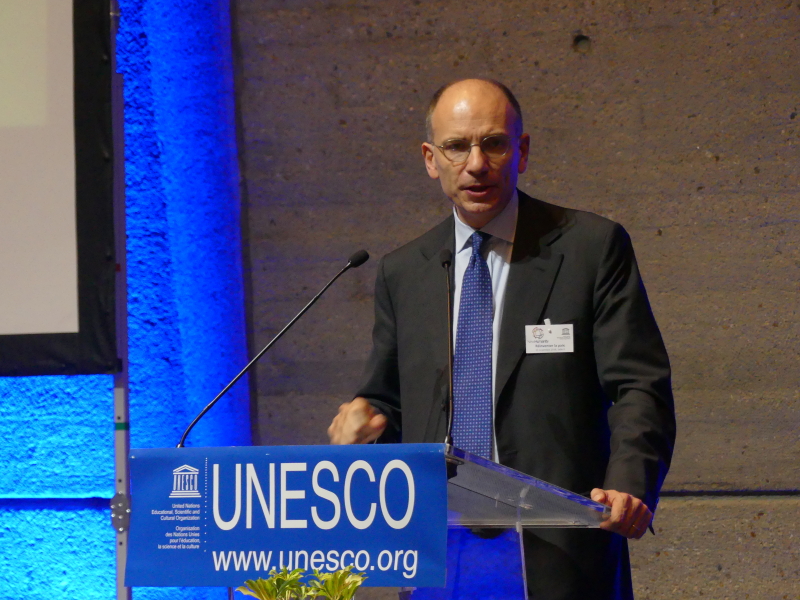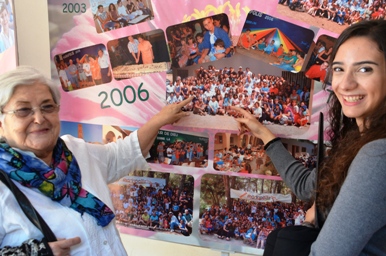
Fifty Years of Dialogue in Algeria
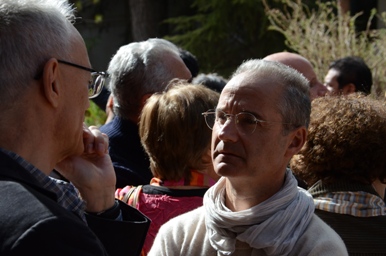 A country in which Christians are less than 1% of the population, Algeria was the first Muslim country to welcome the spirituality of unity in the mid-1960s. They were difficult years of transition and development in this strategic region. Here, the monks of Tibhirine are universally honoured as an example that transcends religious differences and points to the fraternal relationship that unites all the members of the human race. “Chiara Lubich had invited us not to stop in the face of the present difficulties,” Rosi Berolasi recalls. She spent 13 years in the focolare in Algiers. “Looking at it through her eyes, the experience we lived was charged with hope. She already saw the life that would later develop.” Rosi goes on to say: “Also the then bishop of Algiers, Cardinal Duval, had always encouraged us and today we are glad to say that there are Muslim men and women who have their own experience as members of the Focolare Movement.” In Tlemcen the 50th anniversary of the Focolare Movement’s arrival was celebrated last year at the beginning of November. Algeria opened the door to many other countries of North Africa and the Middle East. Archbishop Emeritus of Algiers, Archbishop Tessier, and Bishop of Orano, Bishop Vesco also attended the celebrations, along with Focolare co-president, Jesús Morán and people representing Focolare communities in several regions of the Middle East, inlcuding Syria. French focolarino, Pierre Le Vaslot, who now lives in Italy, remembered their arrival as if it was yesterday. He spoke at the current Mariapolis Centre which is named after Ulisse Caglioni (March 5, 1943 – September 1, 2003). Ulisse was one of those focolarini that spent their lives giving selfless witness to universal brotherhood ever since they arrived on October 5, 1966 in a Citroën that they had driven all the way from Paris.
A country in which Christians are less than 1% of the population, Algeria was the first Muslim country to welcome the spirituality of unity in the mid-1960s. They were difficult years of transition and development in this strategic region. Here, the monks of Tibhirine are universally honoured as an example that transcends religious differences and points to the fraternal relationship that unites all the members of the human race. “Chiara Lubich had invited us not to stop in the face of the present difficulties,” Rosi Berolasi recalls. She spent 13 years in the focolare in Algiers. “Looking at it through her eyes, the experience we lived was charged with hope. She already saw the life that would later develop.” Rosi goes on to say: “Also the then bishop of Algiers, Cardinal Duval, had always encouraged us and today we are glad to say that there are Muslim men and women who have their own experience as members of the Focolare Movement.” In Tlemcen the 50th anniversary of the Focolare Movement’s arrival was celebrated last year at the beginning of November. Algeria opened the door to many other countries of North Africa and the Middle East. Archbishop Emeritus of Algiers, Archbishop Tessier, and Bishop of Orano, Bishop Vesco also attended the celebrations, along with Focolare co-president, Jesús Morán and people representing Focolare communities in several regions of the Middle East, inlcuding Syria. French focolarino, Pierre Le Vaslot, who now lives in Italy, remembered their arrival as if it was yesterday. He spoke at the current Mariapolis Centre which is named after Ulisse Caglioni (March 5, 1943 – September 1, 2003). Ulisse was one of those focolarini that spent their lives giving selfless witness to universal brotherhood ever since they arrived on October 5, 1966 in a Citroën that they had driven all the way from Paris.  Upon their arrival the three focolarini – Pierre, Ulisse and Salvatore Strippoli – found themselves standing in front of the abandoned Benedictine Monastery that needed to be rebuilt. It had been constructed in the 1950s by German Abbot, Dom Walzer, who had been driven out of German for refusing to welcome Hitler at the Abbey of Beuron. The monastery is built against a mountain, at 900 metres and a few steps away from the tomb of Sufi mystic, Sidi Boumedienne, who left a strong spiritual imprint on the local region and beyond. The location is a perfect setting for gathering, hospitality and dialogue. It’s peaceful and serene. An experience of presence and sharing life began at the Dar es Salam centre in Tlemcen with people from the city. “It was a joy for us in Orano, to see the monastery brought back to life,” says the then young priest Theirry Becker. “But who are these focolarini? Nobody has ever heard of them. They’re neither priests nor monks, yet they live in community. They came to live unity and to make unity come alive in the people around them. I listened to them talk about their ideal, about Chiara Lubich, from whom I began to learn more about the spirituality. They immediately got to work, and Ulisse soon transformed the whole house.” Those were years of constant experiences, such as the contact with Imam Barkat. The focolarini had helped him save his little son, taking him to hospital in the middle of the night and insisting with the doctors. It would be this very Imam and father of the little one, to go to the focolare to give courses on the prophetic Hadiths and offer correct explanations of their spiritual writings. There were also very moving words from the first young people who were regulars at the focolare in Tlemcen in the 1960s – Mourad, Bouziane and Farouk. Now they are happily married with children of their own, and the new generations are carrying forward the ideal which they were the first to believe in. Maria Chiara De Lorenzo
Upon their arrival the three focolarini – Pierre, Ulisse and Salvatore Strippoli – found themselves standing in front of the abandoned Benedictine Monastery that needed to be rebuilt. It had been constructed in the 1950s by German Abbot, Dom Walzer, who had been driven out of German for refusing to welcome Hitler at the Abbey of Beuron. The monastery is built against a mountain, at 900 metres and a few steps away from the tomb of Sufi mystic, Sidi Boumedienne, who left a strong spiritual imprint on the local region and beyond. The location is a perfect setting for gathering, hospitality and dialogue. It’s peaceful and serene. An experience of presence and sharing life began at the Dar es Salam centre in Tlemcen with people from the city. “It was a joy for us in Orano, to see the monastery brought back to life,” says the then young priest Theirry Becker. “But who are these focolarini? Nobody has ever heard of them. They’re neither priests nor monks, yet they live in community. They came to live unity and to make unity come alive in the people around them. I listened to them talk about their ideal, about Chiara Lubich, from whom I began to learn more about the spirituality. They immediately got to work, and Ulisse soon transformed the whole house.” Those were years of constant experiences, such as the contact with Imam Barkat. The focolarini had helped him save his little son, taking him to hospital in the middle of the night and insisting with the doctors. It would be this very Imam and father of the little one, to go to the focolare to give courses on the prophetic Hadiths and offer correct explanations of their spiritual writings. There were also very moving words from the first young people who were regulars at the focolare in Tlemcen in the 1960s – Mourad, Bouziane and Farouk. Now they are happily married with children of their own, and the new generations are carrying forward the ideal which they were the first to believe in. Maria Chiara De Lorenzo

Living the Gospel: Working hand in hand with God
 I thought I knew everything “As a priest, I thought I knew how to judge everything. One day I was invited to celebrate Mass at a retreat of some committed young people. During the rites they explicitly made a pact to be ready to give their lives for each other. I was shocked! Would I have been able to do such a thing? All that I knew it seemed, although not useless, was insufficient to be a true Christian. How many things were neglected in the name of studies? How many omissions were justified with some effort I thought was important! Those young people have changed my life.” (RP – France) Before the offering “After moving into the new village, the friendship that was born with a family in the neighbourhood greatly helped us to insert ourselves into the new environment, even helping the children get to school. There was mutual esteem.The children of that family called us uncle and auntie and so did our children also address them that way. Unfortunately, in time the relationship became a bit strained and the children of these neighbours began to greet us with a formal “Good morning”. It could not go on like this also because we belonged to the same parish. One Sunday at Mass, the Gospel passage reminded us that before making an offering at the altar, it would be well to reconcile oneself with the brother. My wife and I looked at each other and we decided to act accordingly. After Mass, we approached those neighbours and asked their forgiveness if we had offended them in some way. After a moment of awkwardness, we hugged each other.” (AT – Hungary) She was another person “In the hospital where I work as a gynecologist, a woman known as a prostitute was admitted. Other patients and even some nurses tried to avoid her. Noticing her isolation, I gave her particular attention and this encouraged others to also talk to her and give her some help. The same sad story of her life attracted attention and benevolence. In just a few days, she already seemed another person. When she was discharged from the hospital, she thanked me saying, “True healing is not physical. Life starts again in another way.” (MS – Poland)
I thought I knew everything “As a priest, I thought I knew how to judge everything. One day I was invited to celebrate Mass at a retreat of some committed young people. During the rites they explicitly made a pact to be ready to give their lives for each other. I was shocked! Would I have been able to do such a thing? All that I knew it seemed, although not useless, was insufficient to be a true Christian. How many things were neglected in the name of studies? How many omissions were justified with some effort I thought was important! Those young people have changed my life.” (RP – France) Before the offering “After moving into the new village, the friendship that was born with a family in the neighbourhood greatly helped us to insert ourselves into the new environment, even helping the children get to school. There was mutual esteem.The children of that family called us uncle and auntie and so did our children also address them that way. Unfortunately, in time the relationship became a bit strained and the children of these neighbours began to greet us with a formal “Good morning”. It could not go on like this also because we belonged to the same parish. One Sunday at Mass, the Gospel passage reminded us that before making an offering at the altar, it would be well to reconcile oneself with the brother. My wife and I looked at each other and we decided to act accordingly. After Mass, we approached those neighbours and asked their forgiveness if we had offended them in some way. After a moment of awkwardness, we hugged each other.” (AT – Hungary) She was another person “In the hospital where I work as a gynecologist, a woman known as a prostitute was admitted. Other patients and even some nurses tried to avoid her. Noticing her isolation, I gave her particular attention and this encouraged others to also talk to her and give her some help. The same sad story of her life attracted attention and benevolence. In just a few days, she already seemed another person. When she was discharged from the hospital, she thanked me saying, “True healing is not physical. Life starts again in another way.” (MS – Poland)
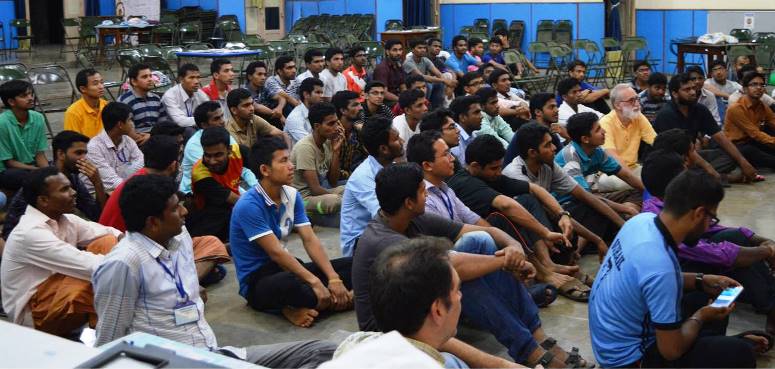
170 Seminarians at a Workshop in India
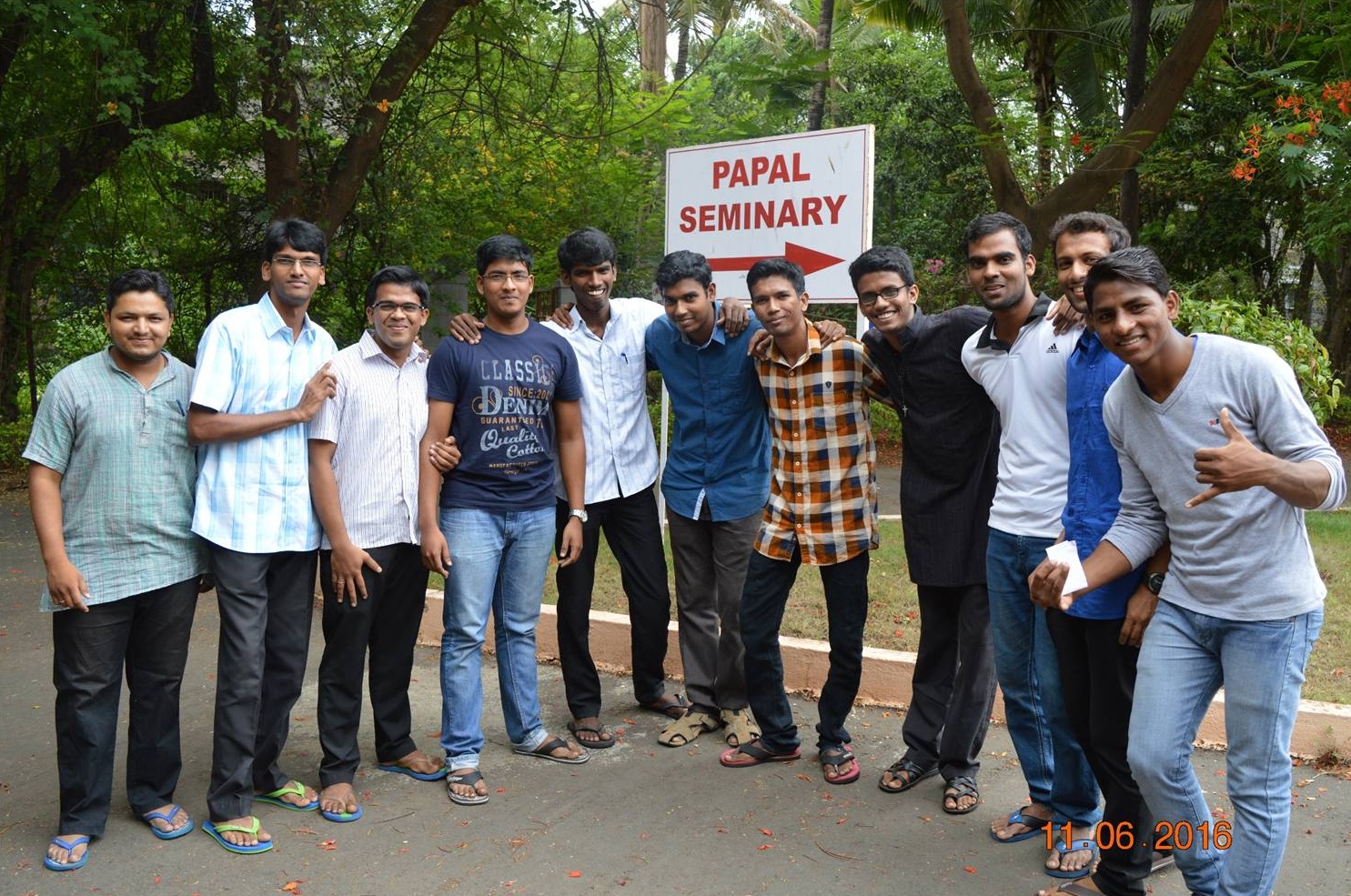 “I learned to be open and not to sweep the dust under the rug,” remarked one seminarians who had attended the workshop on group dynamics based on the Focolare’s spirituality of unity. “I realized that I have to think positive in all that I do,” said another one with great enthusiasm. The spirit of these young men is striking. It is also surprising that in India – a land with thousands of rites and divinities, a land of Hinduism and Buddhism – there should a Catholic seminary with so many young men. The Focolare’s relationship with the Pontifical Seminary of India goes back to 1980. Since then, focolarini on various occasions have been invited to present their spirituality to the seminarians. Many of those seminarians who moved on to become priests and bishops continued to promote the communitarian dimension of the Christian message, which is not always easy to do in their pastoral ministry. In 2016 they asked the Movement for a three-day workshop on group dynamics. It was the first time that the focolarini in Mumbai were faced with such a project, but they accepted the challenge. With a team of 12 men, women, experts from the fields of psychology and relationship, they got to work at putting together a programme for seminarians. It was a demanding task, because of the diversity of cultures among the seminarians who came from all over India, and also because of their different courses of study: from high school to philosophy and theology. The goal of the workshop was to provide the seminarians the tools they could use to help create a community. They had been asked to draw on those elements of Focolare spirituality that have to do with interpersonal relationships: “making ourselves one” with the other; deep listening; the pact of mutual love; sharing experiences of living the Word; giving priority to relationships. These tools were presented from the point of view of psychology and interpersonal relationships through a mixture of brief reports, roll play, testimonies of lay people and clergy and applying the tools to their own lives.
“I learned to be open and not to sweep the dust under the rug,” remarked one seminarians who had attended the workshop on group dynamics based on the Focolare’s spirituality of unity. “I realized that I have to think positive in all that I do,” said another one with great enthusiasm. The spirit of these young men is striking. It is also surprising that in India – a land with thousands of rites and divinities, a land of Hinduism and Buddhism – there should a Catholic seminary with so many young men. The Focolare’s relationship with the Pontifical Seminary of India goes back to 1980. Since then, focolarini on various occasions have been invited to present their spirituality to the seminarians. Many of those seminarians who moved on to become priests and bishops continued to promote the communitarian dimension of the Christian message, which is not always easy to do in their pastoral ministry. In 2016 they asked the Movement for a three-day workshop on group dynamics. It was the first time that the focolarini in Mumbai were faced with such a project, but they accepted the challenge. With a team of 12 men, women, experts from the fields of psychology and relationship, they got to work at putting together a programme for seminarians. It was a demanding task, because of the diversity of cultures among the seminarians who came from all over India, and also because of their different courses of study: from high school to philosophy and theology. The goal of the workshop was to provide the seminarians the tools they could use to help create a community. They had been asked to draw on those elements of Focolare spirituality that have to do with interpersonal relationships: “making ourselves one” with the other; deep listening; the pact of mutual love; sharing experiences of living the Word; giving priority to relationships. These tools were presented from the point of view of psychology and interpersonal relationships through a mixture of brief reports, roll play, testimonies of lay people and clergy and applying the tools to their own lives.  Right from the start the workshop was enthusiastically received and supported by the lively participation, which helped to make the passage from “me to us” that the young men were trying to make. Such a process will be very useful to them when they return to work in groups, and when they will be called upon to start up and conduct groups of other people. It will enable them to put into practice that culture of encounter that is so underscored by Pope Francis. Father George called the workshop “an authentic experience of God among the people.” The intuition to translate the spirituality into life, and the ideas into daily life, turned out to be a winning idea. This is confirmed by the abundant feedback that was written by the participants: “I can everything, but under one condition: that I’m always attentive to the others.” “The encouragement to put the Gospel into practice and not only study it, provoked a radical change in my life.” “This workshop has turned out to be a springboard for my vocation and my way of interacting. The other people’s stories were a great lesson for me.” “It was an extremely fruitful experience of training in being communion. New paths have opened before us. It’s a grace to be able to offer the spirituality of unity in the current social context.”
Right from the start the workshop was enthusiastically received and supported by the lively participation, which helped to make the passage from “me to us” that the young men were trying to make. Such a process will be very useful to them when they return to work in groups, and when they will be called upon to start up and conduct groups of other people. It will enable them to put into practice that culture of encounter that is so underscored by Pope Francis. Father George called the workshop “an authentic experience of God among the people.” The intuition to translate the spirituality into life, and the ideas into daily life, turned out to be a winning idea. This is confirmed by the abundant feedback that was written by the participants: “I can everything, but under one condition: that I’m always attentive to the others.” “The encouragement to put the Gospel into practice and not only study it, provoked a radical change in my life.” “This workshop has turned out to be a springboard for my vocation and my way of interacting. The other people’s stories were a great lesson for me.” “It was an extremely fruitful experience of training in being communion. New paths have opened before us. It’s a grace to be able to offer the spirituality of unity in the current social context.”
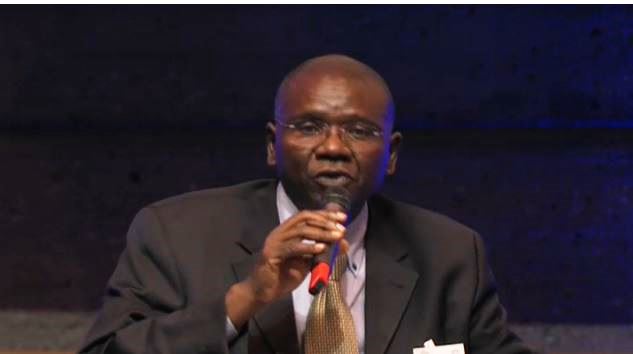
Human Rights from the collective standpoint: an African perspective
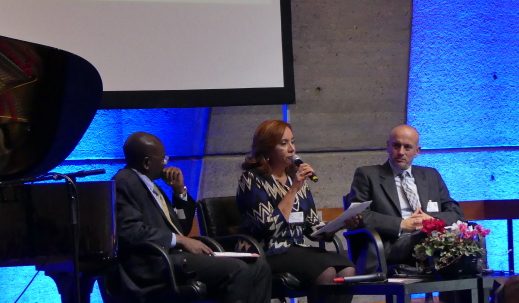 «In a world where globalisation dictates its laws, one of the most important paradoxes we are encountering is that the voice of the southern end of the world is being ignored. Though rich in natural resources like diamonds, gold, oil and other precious minerals, Africa faces: growing poverty and underdevelopment, the worst life expectancy, and a high level of illiteracy, despite the millions of dollars in western aid deposited along the years in various projects. Why? The dramatic response is not only the war we have to suffer, or diseases, but especially corruption which in Africa has become a normal and accepted fact, tearing the continent apart. It is a continent in which the poor have to be corrupt in order to survive, get treated in hospitals, enter one of the “best” professional schools, obtain jobs and get out of jail. Not even the laws are able to eradicate this evil. In most African countries, the law is of western origin, with some nuances taken from local cultures. Protection of the individual alone, for as much as is universally accepted, goes against the principle of the community, most dear to African traditions and that underline the importance of solidarity. The individual is such only if he belongs to a community and acts in function of the community. It is the principle of the “Ubuntu”: I exist because we exist. In the African culture, the Ubuntu is an invitation to support and help each other; it is the awareness of one’s own duties. This how Nelson Mandela put it: Ubuntu means to ask oneself, “Do I want to help the community around me to improve?” It is a rule of life based on respect for others, and a belief in a bond of sharing which unites all of humanity. It is a desire for peace. And yet, precisely in Africa, peace is lacking in many places and the remote cause of the conflicts is absurdly one’s own immense wealth. There are battles to control the minerals and the victims of these conflicts are the weakest people. In the effort to integrate one’s own values with those inherited from colonisation and in the face of the challenges of a world in which economic development gives the right to speak up, Africa is increasingly losing its own values, without acquiring the truly important ones. In my country, Cameroon, which is full of corruption, a small town arose. Chiara Lubich created it by carrying out social
«In a world where globalisation dictates its laws, one of the most important paradoxes we are encountering is that the voice of the southern end of the world is being ignored. Though rich in natural resources like diamonds, gold, oil and other precious minerals, Africa faces: growing poverty and underdevelopment, the worst life expectancy, and a high level of illiteracy, despite the millions of dollars in western aid deposited along the years in various projects. Why? The dramatic response is not only the war we have to suffer, or diseases, but especially corruption which in Africa has become a normal and accepted fact, tearing the continent apart. It is a continent in which the poor have to be corrupt in order to survive, get treated in hospitals, enter one of the “best” professional schools, obtain jobs and get out of jail. Not even the laws are able to eradicate this evil. In most African countries, the law is of western origin, with some nuances taken from local cultures. Protection of the individual alone, for as much as is universally accepted, goes against the principle of the community, most dear to African traditions and that underline the importance of solidarity. The individual is such only if he belongs to a community and acts in function of the community. It is the principle of the “Ubuntu”: I exist because we exist. In the African culture, the Ubuntu is an invitation to support and help each other; it is the awareness of one’s own duties. This how Nelson Mandela put it: Ubuntu means to ask oneself, “Do I want to help the community around me to improve?” It is a rule of life based on respect for others, and a belief in a bond of sharing which unites all of humanity. It is a desire for peace. And yet, precisely in Africa, peace is lacking in many places and the remote cause of the conflicts is absurdly one’s own immense wealth. There are battles to control the minerals and the victims of these conflicts are the weakest people. In the effort to integrate one’s own values with those inherited from colonisation and in the face of the challenges of a world in which economic development gives the right to speak up, Africa is increasingly losing its own values, without acquiring the truly important ones. In my country, Cameroon, which is full of corruption, a small town arose. Chiara Lubich created it by carrying out social  work in favour of the Bangwa people who were at risk of extinction but found salvation instead. But with this work, Chiara above all introduced a new lifestyle, drawing inspiration from the principle of fraternity: giving rise to a coexistence inspired by reciprocity in true justice, which squashes every quarrel, prevents conflicts, and finds solutions to problems also in the families; nobody steals, kills, and the “paths of peace” are pursued. Fraternity can thus become also a lawful principle for coexistence, change relationships in the name of acceptance and inclusion, and translate into solidarity, responsibility and mutual assistance. Peace is expressed today as development, security, universality of human rights, and respect for life: peace is a right, but awaits that lawfulness to be used as its tool. And for this, Declarations and Treaties will not suffice if expressed only in the singular sense, affirming the individual and giving room to interests and conflicts. The “universal” does not mean “absolute,” but “collective”; it is what unites otherwise there will be no relationships between individuals and cultures, or concepts that clash with each other . And if universality enclosed in human dignity allows relationships with each other, fraternity which is the new paradigm, may be the new inspiring principle until it “becomes” also part of the legal system that paves the way for peace. What is born in the heart and translated into coherent attitudes in daily life, will be able to transform relational conflicts into sharing, and ultimately into reciprocity, where what is due is given as a gift to others». Raphaël Takougang
work in favour of the Bangwa people who were at risk of extinction but found salvation instead. But with this work, Chiara above all introduced a new lifestyle, drawing inspiration from the principle of fraternity: giving rise to a coexistence inspired by reciprocity in true justice, which squashes every quarrel, prevents conflicts, and finds solutions to problems also in the families; nobody steals, kills, and the “paths of peace” are pursued. Fraternity can thus become also a lawful principle for coexistence, change relationships in the name of acceptance and inclusion, and translate into solidarity, responsibility and mutual assistance. Peace is expressed today as development, security, universality of human rights, and respect for life: peace is a right, but awaits that lawfulness to be used as its tool. And for this, Declarations and Treaties will not suffice if expressed only in the singular sense, affirming the individual and giving room to interests and conflicts. The “universal” does not mean “absolute,” but “collective”; it is what unites otherwise there will be no relationships between individuals and cultures, or concepts that clash with each other . And if universality enclosed in human dignity allows relationships with each other, fraternity which is the new paradigm, may be the new inspiring principle until it “becomes” also part of the legal system that paves the way for peace. What is born in the heart and translated into coherent attitudes in daily life, will be able to transform relational conflicts into sharing, and ultimately into reciprocity, where what is due is given as a gift to others». Raphaël Takougang
Jesús Morán. The Unity of Humankind and a Culture of Peace
Jesús Morán © Fabio Bertagnin – CSC Audiovisivi
Jesús Morán © Fabio Bertagnin – CSC Audiovisivi
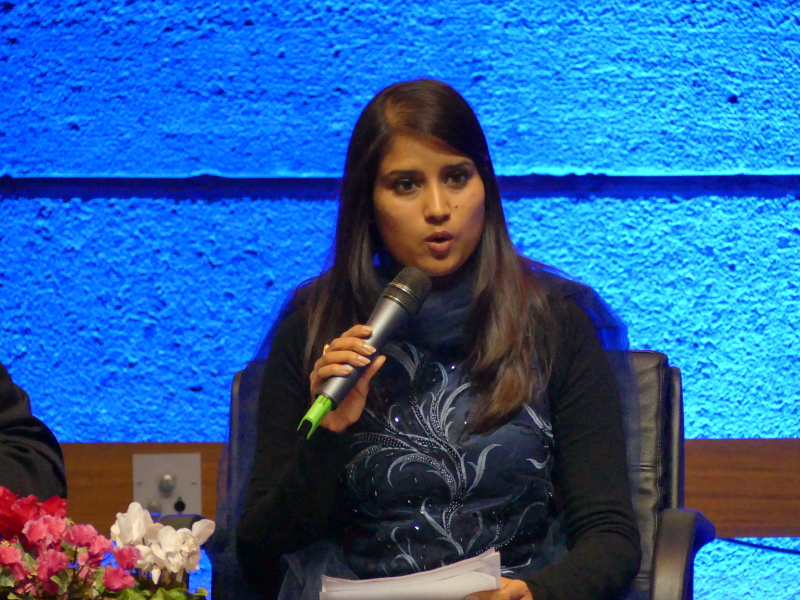
Educating for peace: a commitment and a choice
“Today’s young people aspire to become global citizens and we aspire to a united world,” concluded Arooj Javed, a young student in International Relations, a statement which sums up the objectives of New Humanity.
This celebration of the 20th anniversary of the awarding of the Peace Education Prize to Chiara Lubich was not a nostalgic revisiting of the event. The recent US elections, the tragedy of refugees, climatic change, rising inequality, the greed-dominated markets – all these dramatic happenings, evoked by the various speakers, fully justified the title chosen for the symposium: “Reinventing Peace”. It was to discover – beginning with the Focolare communitarian spirituality – “new solutions” to the “agonizing face of new situations of war”, as expressed by Jesús Morán, the co-President of the Movement. Several catchphrases shed light on these reflections: intercultural laboratories, universal brotherhood, interreligious solidarity, the efforts of co-habitation and, above all, education in dialogue and peace.
“We need to dialogue as if in an orchestra, where each instrument is played in harmony with the others, thus creating a symphony,” Msgr Francesco Follo, permanent observer of the Holy See to UNESCO, said poetically. And Enrico Letta, President of the Jacques Delors Institute and former Prime Minister of Italy, commented: “In order to dialogue we must be aware that we are all minority groups on this earth. (…) If we make our own the fresh outlook and openness of young people, we can better understand that education for dialogue needs to be our fundamental mission.” One of the proposals outlined in the final declaration was a very practical one: “To offer Member States training courses for teachers in the art of global living”.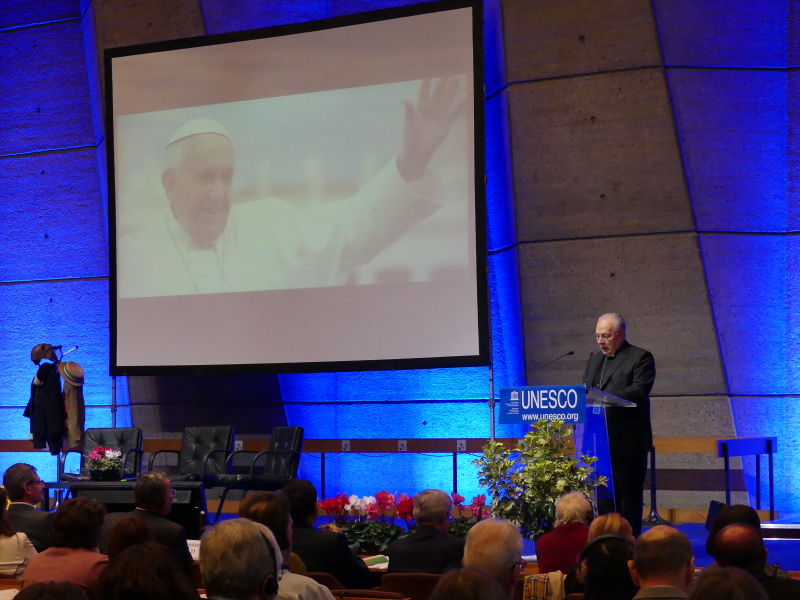
Francesco Follo, permanent observer of the Holy See to UNESCO, Photo © Fabio Bertagnin – CSC Audiovisivi
Chantal Joly (Paris)
M. Grazia Nesi Ollani
- Date of Death: 16/11/2016
- Branch of belonging: Member of New Families
- Nation: Italy
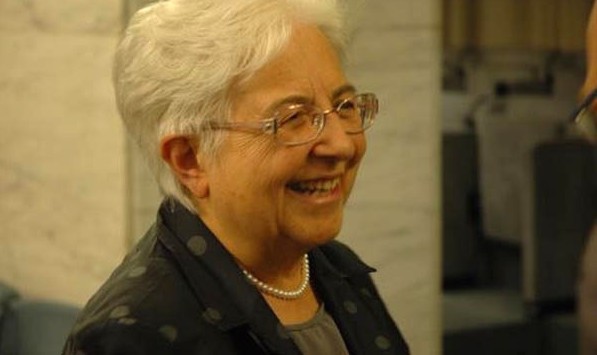
Maria Voce: “Reinventing peace”
 “Every day we are presented with images of a world torn by conflicts of all kinds; we see walls being built, migrants and refugees fleeing from poverty and war; and contrasting forms of political self-interest fail to consider the human consequences of their actions.” This was Focolare President Maria Voce’s description of the world scene today, in a talk read on her behalf by Catherine Belzung. This world scene, she recalled, has often been described by Pope Francis as a “piecemeal third world war”. Its violence is unconventional, ubiquitous and pervasive; it is hard to defeat with the tools used up to now. … These conflicts can only be ended through collective commitment, not only on the part of the international community but by the community of all people in the world. No one can consider themselves excluded from this process. It must go through our streets, into our workplaces, our educational establishments, into sports centres and places of entertainment, communication and worship. The response to the “piecemeal world war” is to build world peace “one piece at a time”, through small steps, and concrete gestures. Everyone has a role to play. Everyone is responsible.” Maria Voce emphasised the commitment of international organisations, civil society, associations and movements. She mentioned her own movement which draws on the experience of 70 years of work for unity and peace initiated by Chiara Lubich and taken ahead in the most varied parts of the world in a 360ͦ dialogue, with in the Christian world, with other religions and with people of non-religious beliefs. It is a dialogue “founded on receptivity to people, on a deep understanding of their choices and ideas, appreciating all that is beautiful and positive, all that we might hold in common and that can create bonds. Fraternity can give rise to projects and actions in the complex political, economic, cultural and social fabric of our world. Fraternity Maria Voce affirmed, quoting Chiara Lubich “can give rise to projects and actions in the complex political, economic, cultural and social fabric of our world. Fraternity brings peoples out of their isolation and can offer the opportunity for development to those still excluded from it. It shows us how to resolve differences peacefully and relegates war to history books. Fraternity in action allows us to dream and even to hope for some kind of communion of goods between rich countries and poor countries, given that the scandalous economic inequality in today’s world is one of the main causes of terrorism. The deep need for peace expressed by humanity today shows that living as brothers and sisters is not only a value, not only a method, but is a global paradigm for political development».[1] “On these foundations, Maria Voce continued, it is possible to rethink peace, indeed to reinvent it.” She gave some examples, first of all a profound commitment to dialogue; engaging in projects that are not conditioned by short term or partial interests; breaking down the walls of indifference and acting responsibly to reduce inequality; promoting a culture of legality and caring for creation. Reinventing peace means loving our enemies. … Reinventing peace means forgiveness. Forgiveness is not the opposite of international justice but makes it possible for relationships to start again on a different footing. … This is why work is needed in terms of education and culture. We need to invest in knowledge and learning, as this Institution does … Lastly, reinventing peace means loving other countries as our own, loving other peoples, ethnicities and cultures as our own. Read the full text [1] Message to Prof. Benjamin Barber for the Interdependence Day, Rome, 10th November 2003.
“Every day we are presented with images of a world torn by conflicts of all kinds; we see walls being built, migrants and refugees fleeing from poverty and war; and contrasting forms of political self-interest fail to consider the human consequences of their actions.” This was Focolare President Maria Voce’s description of the world scene today, in a talk read on her behalf by Catherine Belzung. This world scene, she recalled, has often been described by Pope Francis as a “piecemeal third world war”. Its violence is unconventional, ubiquitous and pervasive; it is hard to defeat with the tools used up to now. … These conflicts can only be ended through collective commitment, not only on the part of the international community but by the community of all people in the world. No one can consider themselves excluded from this process. It must go through our streets, into our workplaces, our educational establishments, into sports centres and places of entertainment, communication and worship. The response to the “piecemeal world war” is to build world peace “one piece at a time”, through small steps, and concrete gestures. Everyone has a role to play. Everyone is responsible.” Maria Voce emphasised the commitment of international organisations, civil society, associations and movements. She mentioned her own movement which draws on the experience of 70 years of work for unity and peace initiated by Chiara Lubich and taken ahead in the most varied parts of the world in a 360ͦ dialogue, with in the Christian world, with other religions and with people of non-religious beliefs. It is a dialogue “founded on receptivity to people, on a deep understanding of their choices and ideas, appreciating all that is beautiful and positive, all that we might hold in common and that can create bonds. Fraternity can give rise to projects and actions in the complex political, economic, cultural and social fabric of our world. Fraternity Maria Voce affirmed, quoting Chiara Lubich “can give rise to projects and actions in the complex political, economic, cultural and social fabric of our world. Fraternity brings peoples out of their isolation and can offer the opportunity for development to those still excluded from it. It shows us how to resolve differences peacefully and relegates war to history books. Fraternity in action allows us to dream and even to hope for some kind of communion of goods between rich countries and poor countries, given that the scandalous economic inequality in today’s world is one of the main causes of terrorism. The deep need for peace expressed by humanity today shows that living as brothers and sisters is not only a value, not only a method, but is a global paradigm for political development».[1] “On these foundations, Maria Voce continued, it is possible to rethink peace, indeed to reinvent it.” She gave some examples, first of all a profound commitment to dialogue; engaging in projects that are not conditioned by short term or partial interests; breaking down the walls of indifference and acting responsibly to reduce inequality; promoting a culture of legality and caring for creation. Reinventing peace means loving our enemies. … Reinventing peace means forgiveness. Forgiveness is not the opposite of international justice but makes it possible for relationships to start again on a different footing. … This is why work is needed in terms of education and culture. We need to invest in knowledge and learning, as this Institution does … Lastly, reinventing peace means loving other countries as our own, loving other peoples, ethnicities and cultures as our own. Read the full text [1] Message to Prof. Benjamin Barber for the Interdependence Day, Rome, 10th November 2003.
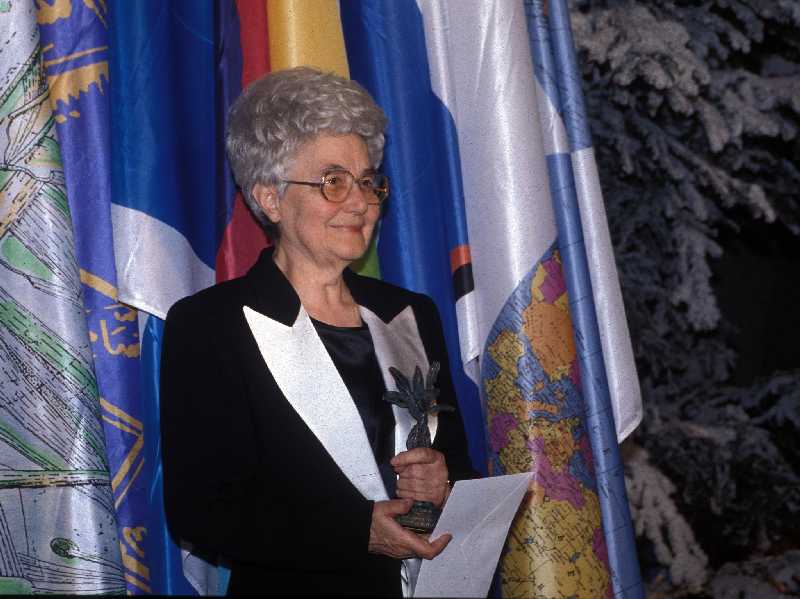
UNESCO remembers Chiara Lubich
Live streaming can be followed from 10.00 to 13.00hrs and from 15.00 to 18.00hrs.  The event “Reinventing Peace” will be held at the UNESCO headquarters just two days after the first anniversary of the tragic terrorist attacks that happened in Paris. On the twentieth anniversary of the Prize for Peace Education awarded to Chiara Lubich, the Focolare Movement, in collaboration with the Directorate-General of UNESCO and the Permanent Observer Mission of the Holy See, will give voice to the commitment towards building peace and universal brotherhood lived with determination and creativity in many places all over the world. As Maria Voce, President of the Focolare Movement, said at the United Nations in April 2015, this daily commitment, which involves people of different cultures and religions, “is not limited to tollerance or to just accepting diversity”, but “it goes even beyond reconciliation, and creates, so to say, a new identity, which is broader and more shared. It is dialogue in action, which involves people of different beliefs, even non-religious ones, and urges towards answering to practical needs”. While referring to the actual commitment exercised even in situations affected by serious crises, Maria Voce stated that “it is not the time for half measures. If extreme violence is present, (…) the answer to it should be as radical, but structurally different, which means that one should answer with the extremism of dialogue. This dialogue requires maximum involvement; it is risky, demanding, challenging and aims at eradicating the roots of misunderstanding, fear and resentment”. The programme will be introduced by Marco Desalvo, President of New Humanity (the Focolare Movement NGO at the United Nations) and by a UNESCO Representative. Then, there will a word of welcome by Mons. Francesco Follo, Permanent Observer of the Holy See, followed by a talk from Jesús Morán, the Co-president of the Focolare Movement. This session will be concluded by Maria Voce, who will address the audience about “Reinventing peace”. The second part of the morning session will be interdisciplinary and intergenerational, and it will be enriched by multimedia contents. Concrete evidence in favour of unity and peace will be shared during the five brief panel talks on: Peace is Education; Peace is an Asset; Peace is Right; Peace is Green; Peace is Art. “Dialogue as a remedy for divisions in the world”, the theme for the afternoon session, will focus on key ideas for a new humanism that leads to the unity of the human family. The opening address of this session will be given by Enrico Letta, President of the Jacques Delors Institute, Discussions on two main topics will follow Rita Moussallem, co-director of the Focolare International Centre for Interreligious Dialogue will be the moderator on the panel for the first topic: “Religions: a problem or a resource for peace?”. The speakers will be Adnane Ben Abdelmajid Mokrani, Pontifical Institute for Arabic and Islamic Studies, Italy; Fabio Petito, International Relations at Sussex University, United Kingdom and Léonce Bekemans, economist and specialist of European Studies at “Chaire Jean Monnet”, Italy. The second topic: “Politics and economy in international disorder” will be moderated by Pál Tóth, Sophia University Institute, Italy. Pasquale Ferrara, Ambassador of Italy to Algeria; Silvia Costa, Chairperson of the European Parliament Commission on Culture and Education; and Damien Kattar, former Lebanese Minister of Finance will be the members on the second panel. Source: Press releases (SIF) Brochure: page1 – page 2 Invitation: Unesco Event Read Chiara Lubich’s speech in 1996
The event “Reinventing Peace” will be held at the UNESCO headquarters just two days after the first anniversary of the tragic terrorist attacks that happened in Paris. On the twentieth anniversary of the Prize for Peace Education awarded to Chiara Lubich, the Focolare Movement, in collaboration with the Directorate-General of UNESCO and the Permanent Observer Mission of the Holy See, will give voice to the commitment towards building peace and universal brotherhood lived with determination and creativity in many places all over the world. As Maria Voce, President of the Focolare Movement, said at the United Nations in April 2015, this daily commitment, which involves people of different cultures and religions, “is not limited to tollerance or to just accepting diversity”, but “it goes even beyond reconciliation, and creates, so to say, a new identity, which is broader and more shared. It is dialogue in action, which involves people of different beliefs, even non-religious ones, and urges towards answering to practical needs”. While referring to the actual commitment exercised even in situations affected by serious crises, Maria Voce stated that “it is not the time for half measures. If extreme violence is present, (…) the answer to it should be as radical, but structurally different, which means that one should answer with the extremism of dialogue. This dialogue requires maximum involvement; it is risky, demanding, challenging and aims at eradicating the roots of misunderstanding, fear and resentment”. The programme will be introduced by Marco Desalvo, President of New Humanity (the Focolare Movement NGO at the United Nations) and by a UNESCO Representative. Then, there will a word of welcome by Mons. Francesco Follo, Permanent Observer of the Holy See, followed by a talk from Jesús Morán, the Co-president of the Focolare Movement. This session will be concluded by Maria Voce, who will address the audience about “Reinventing peace”. The second part of the morning session will be interdisciplinary and intergenerational, and it will be enriched by multimedia contents. Concrete evidence in favour of unity and peace will be shared during the five brief panel talks on: Peace is Education; Peace is an Asset; Peace is Right; Peace is Green; Peace is Art. “Dialogue as a remedy for divisions in the world”, the theme for the afternoon session, will focus on key ideas for a new humanism that leads to the unity of the human family. The opening address of this session will be given by Enrico Letta, President of the Jacques Delors Institute, Discussions on two main topics will follow Rita Moussallem, co-director of the Focolare International Centre for Interreligious Dialogue will be the moderator on the panel for the first topic: “Religions: a problem or a resource for peace?”. The speakers will be Adnane Ben Abdelmajid Mokrani, Pontifical Institute for Arabic and Islamic Studies, Italy; Fabio Petito, International Relations at Sussex University, United Kingdom and Léonce Bekemans, economist and specialist of European Studies at “Chaire Jean Monnet”, Italy. The second topic: “Politics and economy in international disorder” will be moderated by Pál Tóth, Sophia University Institute, Italy. Pasquale Ferrara, Ambassador of Italy to Algeria; Silvia Costa, Chairperson of the European Parliament Commission on Culture and Education; and Damien Kattar, former Lebanese Minister of Finance will be the members on the second panel. Source: Press releases (SIF) Brochure: page1 – page 2 Invitation: Unesco Event Read Chiara Lubich’s speech in 1996

